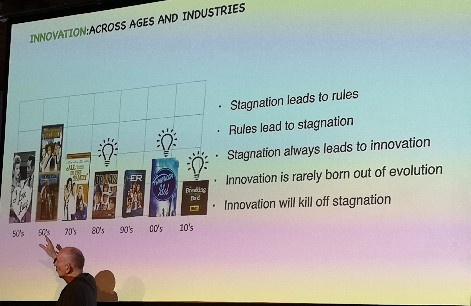Famed UK games designer Peter Molyneux believes he could have been more successful and made more money in his career had he focused his earlier efforts on sequels.
Speaking at Casual Connect, Molyneux hosted a talk on entitled 'Failure: Sowing the Seeds of Innovation'. He said that in his early days, he spent much of his time creating completely new game concepts, from Populous to Dungeon Keeper, and became "obsessed with innovation".
During the early 90s, he said it was considered "the most cardinal sin" to do a sequel and the press would call such a venture a case of "cashing in".
It wasn’t until his studio Lionhead was acquired by Microsoft that “someone sensible” came to Molyneux and suggested they stop doing original games and just focus on Fable.
“And that’s exactly what we did,” he said, with the franchise garnering greater popularity as the series went on.
Molyneux however still had a craving to work on something fresh, new and different.
Finding innovation
He ultimately left Lionhead and set up 22Cans, where he says the team has been at work on searching for the “golden goose” that innovative new games can spawn.
To date, the studio has released titles such as Curiosity: What’s Inside the Cube?, Godus and The Trail. The latter two titles have generated 12 million and 22 million downloads respectively.
Explaining just what innovation is, Molyneux first compared the games industry to television and film, and the similarities between them.
He described how over the decades certain TV shows and films shaped the next decade of entertainment for their mediums as studios chased what they thought was popular with viewers. Major influences, in Molyneux’s opinion, include I Love Lucy, westerns like Gunsmoke, reality tv shows like American Idol and dramas like Breaking Bad, to name a few.

He said that if you look at the app store charts today, they’re similar to this graph.
Molyneux’s point was that while many games are similar as developers go after what they think players want, someone is always going to come along and do something different, like Fortnite.
He admitted that it had taken him 30 years to realise that innovation doesn’t have to be something completely different, but there can be enormous innovation in existing ideas.
One example he used was that of Supercell’s Clash of Clans, which he believes made a simple version of Command & Conquer and Sim City and made them even more accessible to a mass audience.
Innovation isn’t just about having an idea that no one has ever had before, he said.
As he and 22Cans look to the future, he explained how the studio is building a team that embraces the idea that what you’re working on will fail, but with failing you’ll learn a lot.
He said developers owe it to their consumers to give them things they haven’t seen before.
That doesn’t mean giving them something “unbelievably complicated” he stated, but giving them something “unbelievably simple”.
PocketGamer.biz is heading to London this week with our own free 'East Meets West' mini-summit for the games industry on the evening of Wednesday, May 29th, in association with Mintegral.





















